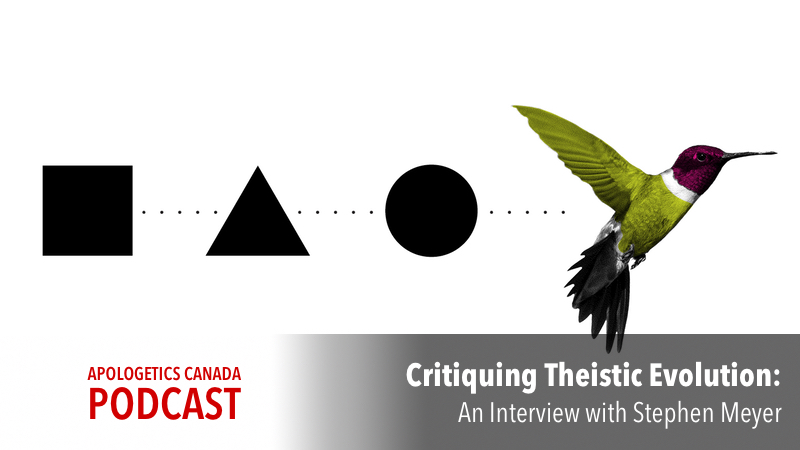The question of the origin of life - and origin of humanity, more specifically - can be an emotionally charged topic. It goes to show that how we answer this question is very important to us. To that end, a number of theories vie for our attention, one of them being theistic evolution, the idea that God used evolution to bring about life on Earth. While some believe that this nicely reconciles Scripture and science, others are concerned about the negative implications for scientific, philosophical, and theological reasons. This week, Andy, Steve, and Terry invited Dr. Stephen Meyer, a leading figure in the Intelligent Design movement, to discuss the book he co-edited recently and get his thoughts on theistic evolution.
Critiquing Theistic Evolution: An Interview with Stephen Meyer
Links & Articles
Center for Science and Culture at Discovery Institute
Theistic Evolution: A Scientific, Philosophical, and Theological Critique eds. J. P. Moreland, Stephen C. Meyer, Chris Shaw, Christopher Shaw, Wayne Grudem, Ann K. Gauger, Ann Gauger
Intro Music

Pivot
by Zac Nelson
Outro Music

Dead Wait
by Glories


LOVED this episode. When can we get Dr. Meyer at the AC conference? I love listening to him. He’s a much needed voice in science today. Douglas Axe would be great to have at the conference too.
Why do Christians need apologetics?
When I tell Christians that I believe that it is it is wrong and foolish to believe any truth claim “by faith”, they complain. “You obviously don’t understand the word ‘faith’. We all use faith in many areas of our lives.” What is the typical evangelical Christian’s definition of faith: Faith is trust based on past performance. It is faith in a person, not so much the claims about that person. It is based on personal knowledge of that person gained by personal experience.
Skeptic: But don’t you believe that faith is a gift from God as the Apostle Paul claims in his Epistle to the Ephesians?
Christian: Yes. The faith that leads us to personally grasp hold of the promises God made to us in Christ Jesus is something that is given to us.
Skeptic: So if we combine these two statements we have this: Faith is trust based on personal knowledge about someone (or some thing); a personal knowledge that is given to us as a gift from God.
Isn’t this statement saying that it is impossible to believe in Jesus as one’s god unless Jesus has gifted you the knowledge (about him) to believe? If that is true, what is the point of Christian apologetics? If only God can flip the switch in the human heart (brain) to believe, why do Christian apologists go to such lengths to debate evidence in an effort to convert skeptical non-believers? And why do Christian apologists accuse skeptics of being biased against “good” evidence, when what they really believe is that no amount of good evidence will ever convince the skeptic to believe in Jesus as his or her Savior? If faith is truly a gift from God, debating evidence is pointless.
So why do Christian apologists persist in doing it?
https://lutherwasnotbornagaincom.wordpress.com/2018/01/14/is-christian-apologetics-as-a-means-of-evangelization-an-oxymoron/
Gary, I will respond by making two points.
First, your definition of faith is incomplete. Certainly there is an element of Christian faith (also called saving faith) which is “trust in a person” and an element of “personal knowledge” based on “personal experience”. And, it is true that saving faith is a gift from God. But these two statements are not mutually exclusive and the reason for that is because there is another aspect to Christian or saving faith that must be considered. Christian faith is NOT blind faith but faith that is built on a rational foundation of logic and evidence. In other words, it is not a faith that is infused into us outside of our natural human and rational processes.
An example is this. Echoing the Apostle Paul’s own position, if incontrovertible proof was given me that Jesus Christ did not in fact rise from the dead I would relinquish my faith. I would realize that my faith was based on straw, unfounded, and futile. Paul discusses this very thing in 1 Corinthians 15. In that chapter he also offers an apologetic – evidence that the resurrection did in fact happen and so his readers’ faith is not in vain but well founded on the real fact of Christ’s physical resurrection. This is why apologetics is important. God gifts us with saving faith but the means by which He does it is consistent with and respectful of our human properties and epistemological means.
Secondly, saving faith is MORE than simple logical conclusions based on evidence…it is built on such evidence and logic as I pointed out above. But saving faith goes beyond that to an existential commitment to the object of our faith. Once a person is convinced of the truth of Christ’s life, death and resurrection he or she may simply remain a believer in the historical facts and the fact that God is. If so, he or she would not have saving faith. Rather, saving faith moves beyond that, building on it for sure, but beyond it to grasp the soul becoming a personal, life transforming commitment to Jesus Christ as Lord and Savior. This part we believe to be a divinely enabled final step to constitute true Christian, saving faith.
So apologetics is a tool to help people build that logical and evidential edifice if you will on which and through which the gift of faith can be opened and embraced.
I hope that helps